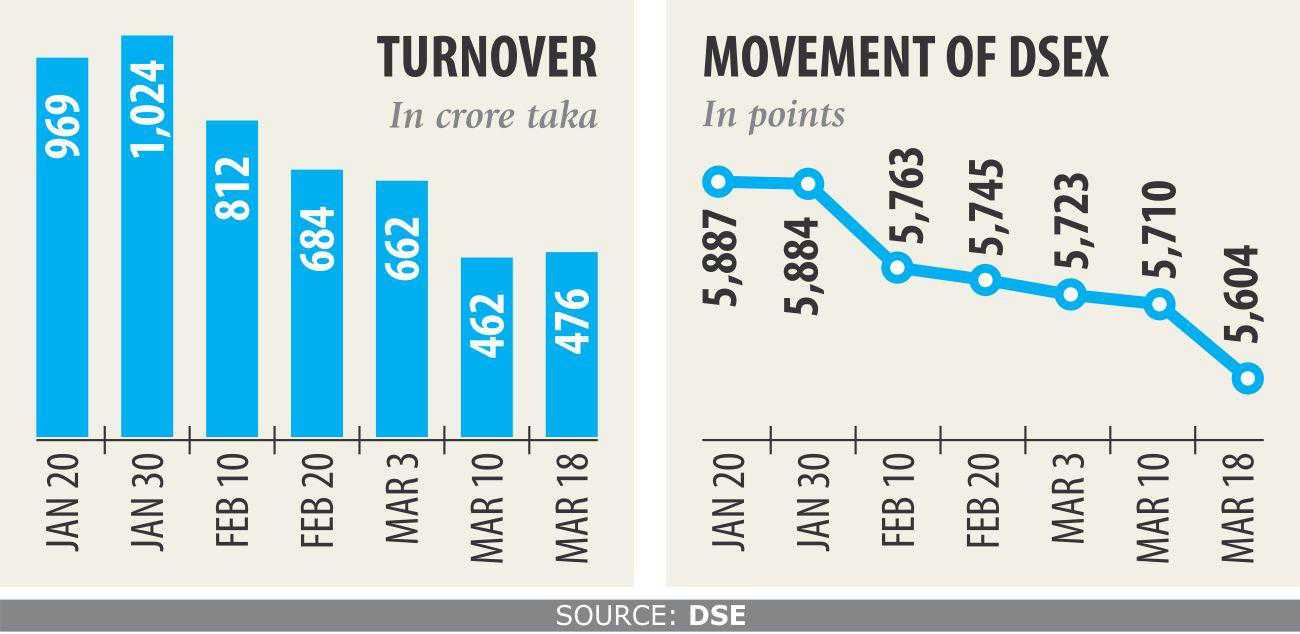Stocks in freefall

What is wrong with the stockmarket when the economy is on a strong footing on many measures, be it GDP growth, export, import, remittance and political stability?
Also, businesses have renewed their confidence in the economy after the December 30 national polls.
The stockmarket's so-called fear about banks' being able to bring down their loan-deposit ratio to 83.5 percent from 85 percent has also been addressed, with the central bank extending the deadline by another six months to September 30.
Earlier, state-owned Investment Corporation of Bangladesh has also been allowed to raise Tk 2,000 crore through bonds in a relaxed rule: banks that will invest in the bond will be exempt from the single borrower exposure limit.
Then, why is the market short on confidence? Both the index and turnover have been on a free fall for about a month. Turnover, which crossed the Tk 1,000 crore-mark on January 30, went down to less than Tk 477 crore yesterday.
The DSEX, the benchmark index of the Dhaka Stock Exchange, plummeted 51 points, or 0.90 percent, to close at 5,604 points yesterday, with 8.82 crore shares and mutual fund units changing hands.
Had the prime movers of the market like Grameenphone, British American Tobacco and Brac Bank gone in the red, the market would have sank more.
Market analysts have identified two reasons for the bear run: lower participation and fear of the interest rate rising for liquidity pressure.
“Most of the institutional investors are on the sidelines,” said the head of portfolio management of a merchant bank, requesting anonymity.
When the interest rate rose in the banking sector the stockmarket faced trouble as investors rushed to banks instead of investing in stocks, he added.
The stockmarket is lagging behind the country's economic progress for want of policy support, said Abu Ahmed, the former chairman of the Dhaka University's economics department.
He went on to urge the authorities to ban dumping of placement shares and bring in well-performing companies to the market to boost investor confidence.
Placement shares are those acquired in a capital raising event for a select group of investors and not from the open market.
Large sums are tied up in placement shares and listed companies are mostly providing stock dividend instead of cash dividend, said Shakil Rizvi, president of the DSE Brokers Association.
“So, the stockmarket was impacted by the lower liquidity,” he said, adding that institutional investors' participation is low too.
Some banks are under pressure to meet the loan-deposit ratio, so their investment dried up, said Md Nazrul Islam Mazumder, chief executive officer of MTB Securities.
“Our general investors also have this problem that when the stockmarket falls they leave the market and when it rises they pour money. The market is now witnessing this behaviour,” he added.
However, foreign investment is rising every day in some stocks, according to the top stock brokers.
In February, net foreign investment was Tk 323.18 crore, up 84.37 percent from the previous month.
Of the traded issues yesterday, 42 advanced, 279 declined and 24 securities closed unchanged on the premier bourse.
Brac Bank dominated the turnover chart with its transaction of 43.06 lakh shares worth Tk 38.20 crore, followed by British American Tobacco Bangladesh, United Power Generation and Distribution, Square Pharmaceuticals and Dutch-Bangla Bank.
Meghna Milk was the day's best performer with 8.64 percent gain, while United Insurance was the worst loser, shedding 11.25 percent. Chittagong stocks closed low with the bourse's benchmark index, CSCX, declining 122.95 points, or 1.16 percent, to finish the day at 10,391.75.
Losers beat gainers as 191 declined, 26 advanced and 14 finished unchanged on the Chittagong Stock Exchange.
The port city bourse traded 43.09 lakh shares and mutual fund units worth Tk 17.49 crore.
Source: https://www.thedailystar.net
Tags :
Previous Story
- Dhaka stocks dip on financial sector liquidity crunch
- Women entrepreneurs seek more bank loans
- Dhaka stocks advance on ADR adjustment time extension...
- World Bank approves $185m for Bangladesh renewable energy...
- Govt sets targets to reduce time, cost for...
- Lafarge, Singer financial reports lift Dhaka stocks
- Incentive for remitters to curb hundi: analysts
- Construction industry booming in Bangladesh